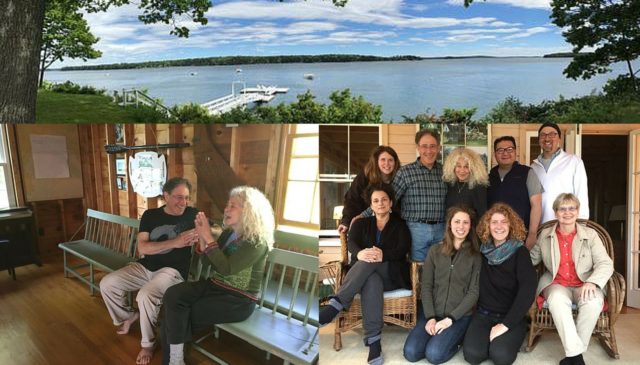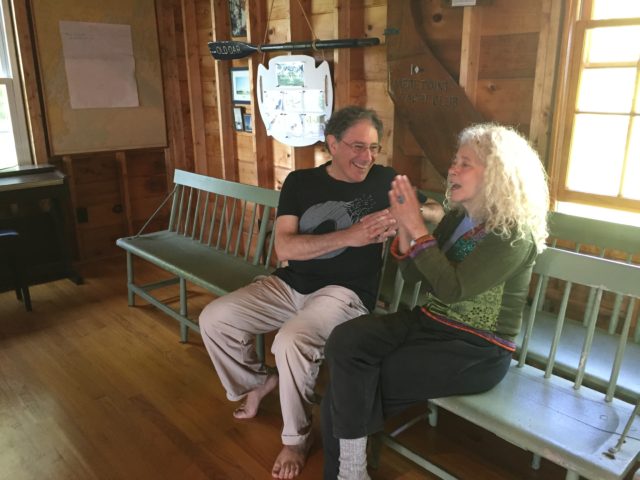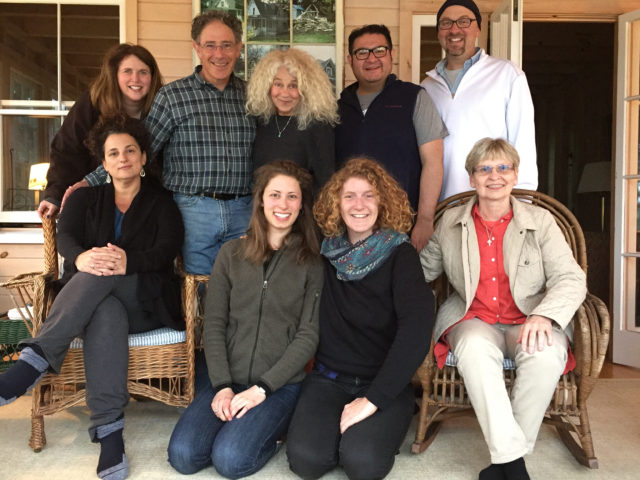Lessons for #eventprofs from an improv and mindfulness workshop — Part 2
I have learned so many lessons from improv. Here are more of my experiences and takeaways for event professionals from the wonderful five-day improv and mindfulness workshop Mindful Play, Playful Mind, held June 8-13 2016, at Mere Point on the beautiful Maine coast — followed by their relevance to event design (red). (Here’s Part 1.)
The YOU game
In the YOU game, participants stand in a circle and create — by saying YOU and pointing to someone — patterns of categories, such as people’s names or breeds of dogs, around the circle. (Detailed description & instructions can be found here.) When you have several different patterns going around simultaneously, things get hectic. When we add people moving to the next person’s place in the pattern while playing, things get…demanding! The game vividly drives home this golden rule: When communicating, ensure your message is received! When everyone successfully implements this rule, the YOU game flows despite its complexity. And when we slip up, the patterns mysteriously disappear…
Successful event professionals learn the importance of this golden rule early! Another way to think about and practice this rule is the ask, tell, ask formulation.
Status
I have written about status in both my books, as it’s an important aspect of event design—and improv. At the workshop, we played several improv games that explored status and allowed us to practice taking status roles and working to change our own or others’ status. One example was a two-person scene we played over and over again with the same dialog:
Player1: Hello.
Player2: Hello.
Player1: Been waiting long?
Player2: Ages.
Each player had the option to choose their original status and then work to raise or lower their own or the other player’s status. Qualities of body stance, control of space, speech, and interaction affect status, and it’s something that I would like to be more aware of in my life. As a facilitator, I typically work to equalize status with people with whom I’m working, but, programmed by my upbringing, I also have a tendency on meeting new people to default to lower status until I know them better. Improv status work helps me become more aware of such proclivities.
Ted also introduced us to Patsy Rotenburg’s Second Circle model of communication and connection, which maps in many ways onto improv status work. Worth checking out!
If you’ve read my books or this blog, you know that I am a proponent of replacing traditional preordained status at events with a peer model where individual status can and does change from moment to moment. Such participant-driven and participation-rich events provide a fluid-status environment that supports leaders and experts appearing and contributing when appropriate and needed.
Building things together
One of the most wonderful things about improv is the opportunities it gives us to experience what can happen when we build something together with others, something that is a true joint creation that would have been different if any one of its creators had not been present. Improv games provide an environment of mutual support, where players add to what’s currently been created. The addition can be of more detail or deeper focus on some aspect, but the whole glorious edifice only increases in size and complexity over time.
Many improv games provide this experience. One that we enjoyed a lot was three-words-at-a-time poems. We wrote group poems, our only instruction being to read what we received and add to it in a way that seemed true to what had already been written. Sitting in a circle, each of us wrote the first three words of a poem. We then passed our paper to the next person, who wrote three more words and passed the paper on again. Our papers circulated twice around the circle, with the starter of each poem contributing the last three words.
Here’s one we created together:
The Dinner
The cold lasagna sat on the white stool.
Uneaten, unloved.
Unlovable.
No cheese?
What, no noodles?
No meat?
No because too much.
VEGETABLES!
The guests departed, deflated, never to return to my sugarless, soulless party.
My hungry friends
Even hungrier for the lost moment
Of Italian goodness lingered beside
White plates and glasses.
Never host again.
I think the most satisfactory experiences I have designing, producing, and facilitating events occur when every person involved contributes creatively to making the event what it becomes. It feels darn good to be part of something wonderful that a group of people built through their work.
Conclusions
I learned so many important lessons from improv at this workshop. Our five days together passed swiftly. Throughout our time together we had moments of play, joy, seriousness, sadness, intimacy, fun, learning, and much laughter. I love workshops like this because they offer and support a unique experience for each participant—prescribed learning objectives are refreshingly absent, though I am sure that each person (including Ted and Lisa) took away something personally meaningful, valuable, and probably important. I’ve only covered some of what I experienced and enjoyed. I recommend Ted and Lisa’s skillful, supportive, and empathetic workshops to anyone who wants to explore the wonders of improv and mindfulness in a community of not-long-to-be-strangers.
I plan to be back next year; please join me!
P.S.
Ted & Lisa’s excellent Monster Baby Podcast just published David Treadwell’s interview with Ted & Lisa, which was recorded during the workshop. They explain “why they offer these retreats, what the weekend usually covers, and how improv skills can lead to a better life.” They also consider what keeps people from such ways of being in their normal lives and when they can get into the “no” mode. David asks how the retreat can help teachers, business professionals, and those in personal relationships before getting into the rewards and challenges of leading such retreats. Ted and Lisa offer a few specific examples of the kinds of exercises they offer. The podcast closes with a few short testimonials from this year’s participants. And if you keep listening past the apparent end, there’s a hidden bonus track improvised performance from Ted and Lisa!”




